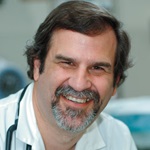Surviving a Stroke: Ryan’s Story

Farming is a way of life for 36-year-old Ryan Zimmerman and his family. Together, they raise nearly 20 beef cattle on their Jeffersonville farm every year. “To me, that’s one of the most fun things we do as a family,” Ryan says. “Spending time together is really what it’s all about.”
A father of four young children, Ryan had his busy routine brought to a screeching halt in January. One morning, just before Ryan was about to get ready for work, he lost feeling on his left side. He also had difficulty swallowing.
“The left side of my arm and legs felt like I was losing feeling in them,” remembers Ryan. “I yelled for my wife and immediately knew something was wrong.” Ryan’s wife, Heidi, called 911. Within a few minutes, Ryan was loaded in an ambulance and transported to Miami Valley Hospital’s Jamestown Emergency Department (ED) in Greene County.
TeleStroke Technology Speeds Treatment
“When Ryan initially came in, he said he was having a difficult time swallowing,” explains Roger Pacholka, MD, emergency physician at the Jamestown ED. “As soon as he said that, I began to think he was having a stroke.”
Dr. Pacholka immediately ordered a CT scan and called a stroke alert in the ED.
While Ryan was getting a CT scan, his condition drastically worsened. He was unable to swallow and lost function in his right and left upper extremities, and it was determined that Ryan would need to be intubated.
“It was very scary, especially having four little kids,” remembers Heidi. “With his age and no prior medical history of any health issues, I was shocked that he was having a stroke.”
Ryan, Heidi, and Dr. Pacholka were connected via the Premier Health TeleStroke network with Robb Snider, MD, a neurologist at the Clinical Neuroscience Institute at Miami Valley Hospital in Dayton. After evaluation, it was determined that Ryan was a good candidate for Tenecteplase, a new clot-busting medication.
Fast Transport for Comprehensive Care
Dr. Pacholka administered the medication and CareFlight Air and Mobile Services transported Ryan by medical helicopter to Miami Valley Hospital, the Dayton area’s only Comprehensive Stroke Center – the highest designation of advanced stroke care a hospital can receive from the Joint Commission and the American Heart Association/American Stroke Association.
By the time CareFlight touched down at Miami Valley Hospital, Ryan’s condition had begun to improve. He was met by members of the neuroscience team, including Bryan Ludwig, MD, a neurointerventional specialist.
“When Ryan landed at our doorstep, his arms and legs were starting to improve,” explains Dr. Ludwig. “His speech was starting to show signs of subtle improvement, which was very encouraging. We knew that the medication therapy seemed to be working at that stage.”
Since the location of Ryan’s stroke was extremely dangerous, Dr. Ludwig felt that it was critical to see if the blockage could cause any more damage. After examination, further life-threatening clots were ruled out.
Returning to Life
Just a few months after his stroke, Ryan is back at work, planning on getting out and spending time with his family and watching his children grow up. He says this experience at a young age has changed his outlook on life.
“I think not taking life for granted, not taking your wife, your kids, anything for granted,” explains Ryan. “It can be taken away from you pretty quickly.”
COVID-19 and Stroke
Many systems in the body are affected by COVID-19, including the neurologic, cardiac, and clotting systems. “COVID seems to affect the harmony of our clotting system, causing blood to clot when it shouldn’t,” says Marc Belcastro, DO, system chief medical officer at Premier Health. “That could lead to an increased risk of heart attack, stroke, or even the loss of a limb.”
Dr. Belcastro encourages patients who have been diagnosed with COVID-19 to be vigilant of their symptoms long after they’ve tested positive, to rest as much as possible, and stay hydrated. But most importantly, those who have not recently tested positive should get a vaccine. “All the masks and social distancing in the world cannot touch the value of the vaccine.”
Back to the Summer 2021 issue of Feel Good magazine.

Know the Signs and Symptoms of a Stroke
Learn how to recognize symptoms and respond quickly.
Find Out More



